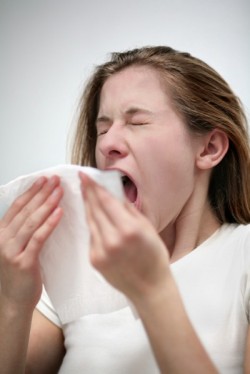~ by Al J. Mooney, MD ~
People in recovery need to avoid taking medication for cold and flu symptoms. Try these ideas for a recovery-safe way to manage your symptoms. These tips were first developed by my mother, Dot Mooney. Grandma Dot, as everyone called her, and my father, John Mooney, MD, were the co-founders of Willingway Hospital. 
1. Get Your Rest Healing from any illness requires your body to call on reserves. Continuing with your normal activities may be possible and desirable when symptoms are minor and risks are low. When symptoms become more severe or the risks of contagion to others with health risk is possible, it may be more important to stick close to home. Chilling out and making sure you get the rest you need will be helpful.
2. Drink Plenty of Fluids Drink plenty of fluids. Make sure they are non-caffeinated so you don’t add to the misery by getting anxiety from too much caffeine. Water is probably best, but fruit juices and beverages like sports drinks can add some calories when you’re too sick to eat much or have a sore throat.
3. Keep Your Head Elevated Elevating your head a little at night will help. Use two pillows. Place one crossways like you normally sleep with it, and the second one lengthwise on a little slant to keep your head up a little.
4. Breathe Humid Air Also helpful is humidity; take a long shower twice a day, and run a humidifier if you have access to one. Steam vaporizers are probably best since they have been redesigned and are safer than they used to be.
5. Use Normal Saline Use saline nose spray. Ayr, Ocean, and Simply Saline are all similar and okay. Use the saline as often as you need to help keep sinus passages clear and prevent a sinus infection requiring antibiotics.
6. Treat Your Cough Safely Use things around the house to make your own cough medicine. Mix three tablespoons of lemon juice with one cup of honey. Stir in about a quarter cup of warm water. Take two tablespoons every four to six hours and at bedtime.
7. Gargle for a Sore Throat Mix a teaspoon of salt in a glass of warm water and use the solution as a gargle several times a day for symptoms of sore throat. If sore throat is severe or persistent, a throat culture should be considered to make sure the symptoms are not due to a strep infection that needs antibiotics. Most sore throats are caused by allergies or viruses and respond well to local care.
8. Clear Your Ears As sinus passages become congested and clogged during the inflammatory reaction of an upper respiratory infection, the air passages to the ears can become obstructed. If swallowing hard and chewing gum don’t relieve the ear pressure, you may need to attempt a Valsalva maneuver. You can do this by closing your mouth, holding your nose while blowing out like you would blow up a balloon. You may need to repeat several times a day.
9. Intensify Your Program of Recovery There is a tendency to avoid recovery activities when a person is sick. Since sickness can make a person more vulnerable, meetings and other rec overy activities can be even more important during times of illness. If its impossible to get to meetings, talk with your sponsor and other fellowship members throughout the day. Bedside meetings can also substitute for the scheduled ones, but remember to take the appropriate actions to prevent contagion.
10. Take Medications When Other Things Don’t Work Non-medicated cough drops are helpful for dry or sore throat as well as simple coughs. These or just hard candy like caramel or cherry flavor can be used without regard to a maximum limit. A couple of 200 mg ibuprofen may help when the other things don’t. Since ibuprofen can irritate the stomach, an alternative of acetaminophen 325 mg (two tablets every 4-6 hours) can be helpful when the supportive measures mentioned here are not enough. Severe flu can be treated with several prescription antiviral medications. Other medications may be important for some illnesses that result from a minor infection. A sinus infection can develop after ten days to two weeks, when your body can’t prevent the damage that leads to another infection; it may need to be treated with antibiotics. Pneumonia can be life-threatening and usually needs antibiotics and sometimes more help in a hospital. So if symptoms keep worsening when you try these suggestions, you may need to see a doctor.
11. Stop the Spread Viruses that spread respiratory infections usually travel from person to person on hands or by atomized secretions from sneezing or coughing, making it imperative to wash hands thoroughly and often. A hand sanitizer without alcohol is also advisable. Cough into your elbow, not your hand.
12. Avoid Risky Things Most medications that people jump to when they have cold or flu symptoms do not change the course of the illness. Some may actually interfere with your body’s ability to heal quickly, or can create complications that are more dangerous. The biggest risk for people in recovery is relapse triggered by use of a mind-altering drug. You don’t want to use a treatment that has more risk than the disease by treating an upper respiratory infection with a mood-altering drug or an antibiotic that works now, but you may need later.
Do you have any great tips for dealing with a cold or the flu when in recovery? Please share them in the comments.

Pingback: Recovery During A Cold | Willingway
Sensible and effective methods unless,of course, infection occurs.